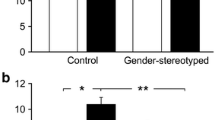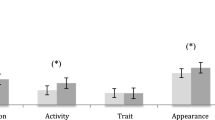Abstract
The present study represents a self-reported behavioral approach to the study of sex differences and sex-role stereotypes. One hundred forty-eight undergraduate women and men responded anonymously in group testing sessions to two questionnaires. The first questionnaire asked them to report their own involvement in 45 masculine and feminine sex-typed behaviors; the second questionnaire asked for their perceptions of the involvement of men and women in the same behaviors. Major findings included (a) sex differences in reported ability, enjoyment, performance, and opportunity which mirrored traditional sex-role stereotypes and indicated greater competence at stereotypic behaviors (the majority of differences significant at p<.001); (b) perceptions of men and women's behavior also consistent with sex-role stereotypes; and (c) sex differences in the perceived appropriateness of behaviors (p<.05) which indicate greater sex-typing in men's (as compared with women's) perceptions of both sexes. The study focuses on the self-reported behavioral bases of gender-specific stereotypes and how these behaviors are influenced by aspects of the social environment (such as reinforcement contingencies) and by aspects of the the person (such as simple learning and performance deficits), and suggests ways in which sex differences might be changed to provide increased behavioral options for women and men.
Similar content being viewed by others
References
Bandura, A. Principles of behavior modification. New York: Holt, 1969.
Bandura, A., & Walters, R. H. Social learning and personality development. New York: Holt, 1963.
Broverman, I. K., Vogel, S. R., Broverman, D. M., Clarkson, F. E., & Rosenkrantz, P. S. Sex-role stereotypes: A current appraisal. Journal of Social Issues, 1972, 28, 59–78.
Condry, J., & Dyer, S. Fear of success: Attribution of cause to the victim. Journal of Social Issues, 1976, 32(3), 63–83.
McKee, J. P., & Sherriffs, A. C. The differential evaluation of males and females. Journal of Personality, 1957, 25, 356–371.
Sherriffs, A. C., & Jarrett, R. F. Sex differences in attitudes about sex differences. Journal of Psychology, 1953, 35, 161–168.
Spence, J. T., Helmreich, R., & Stapp, J. Ratings of self and peers on sex-role attributes and their relation to self-esteem and conceptions of masculinity and feminity. Journal of Personality and Social Psychology, 1975, 32, 29–39.
Author information
Authors and Affiliations
Additional information
Portions of this research were supported by National Institute of Mental Health Grant #5 RO1 MH06613-4. The authors wish to express their gratitude to Drs. David Sanuders, Socrates Rapagna, William Hodges, and Gene Glass for their design, data analytic, and editorial assistance.
Rights and permissions
About this article
Cite this article
Canter, R.J., Meyerowitz, B.E. Sex-role stereotypes: Self-reports of behavior. Sex Roles 10, 293–306 (1984). https://doi.org/10.1007/BF00287782
Issue Date:
DOI: https://doi.org/10.1007/BF00287782




